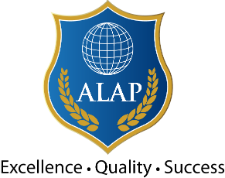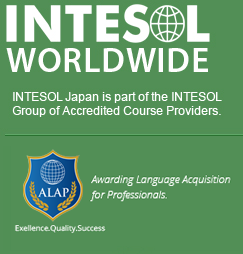Course Aims
The overall aim of the INTESOL Diploma in TESOL is to provide a sound coverage of the theory and derived practice of teaching English to speakers of other languages within different and varied social contexts and with reference to modern communicative methodologies.
Eligibility
This course is targeted at practising teachers or those who wish to further their studies following the Certificate in TESOL. To be eligible for the Diploma in TESOL, prospective students need the following:
– Completed the INTESOL Certificate in TESOL (either the 150 or 180 hour course)
or
– Completed a certified Level 4 TESOL course with a minimum of 120 hours of coursework &
– Have an English language equivalent of IELTS 6.5 or higher (or completed 12 years of schooling in an English medium setting in an English-speaking country)
If you are unsure of your eligibility please email the admissions team at edu@intesoljapan.com
Course Structure
The 350 hour Diploma in TESOL consists of 10 units (a total of 17 modules). Included in the modules are course notes, a variety of self-check exercises and tasks for submission as part of the continual assessment. Your personal trainer marks each module as it is submitted and returns your work with comments, guidance and a module grade so you will be able to monitor your progress. There are no written examinations.
Course Content
Unit 1: Being an Efficient Distance Learner
study skills – managing your time efficiently – organising your schedule – note-taking – overcoming the loneliness of the distance learner – how this course works.
Unit 2: Semantics/Language Awareness
Module 1 – form and function – lexical meaning: denotation, connotation, synonyms, antonyms, hyponyms, polysemes, homonyms – the importance of collocation – time and tense – presents – past tenses – futurity – conditionals and hypothetical meaning
Module 2 – progressive and perfect aspects: form and meaning – the progressive aspect and stative verbs – form and meaning of the perfect aspect – sentence structure: units of language; sentence elements
Module 3 – negatives: types of negation – questions: question types – modality – word classes and phrases – adjectives and adverbs – determiners
Module 4 – prepositions and multi-word verbs – word formation: morphemes
Unit 3: Phonology and Phonetics
Module 1 – attitudes to pronunciation teaching – terminology in phonology and phonetics – organs of speech – phonemes – the phonemic chart – consonants: description and practical applications – vowels – cardinal vowels chart – diphthongs – place of articulation – research based project – materials evaluation
Module 2 – the syllable – consonant clusters – strong and weak syllables – word and sentence stress – the ‘schwa’ sound – marking stress – primary and secondary stress – tendencies in word stress – research based project – weak forms – English as a time-stressed language – Features of connected speech – Materials evaluation
Module 3 – spoken and written forms – intonation – tone units – the tonic syllable – pitch movement – intonation and discourse – teaching and learning intonation – research based project – pronunciation and ‘which’ English – are native speakers the best ESOL teachers? – Strategies for personal development in the teaching of pronunciation
Unit 4: Psycholinguistics
Module 1 – attitudes toward language teaching – good language learners: characteristics and strategies – the teacher’s influence on learner strategies – cognitive strategies – metacognitive strategies – communication strategies – social strategies – learner training – learner training materials evaluation – research based project – observation task
Module 2 – motivation – motivational factors – the teacher’s influence – motivational differences – learner styles – Multiple Intelligence Theory – research based project
Module 3 – first language acquisition: behaviourism, innatism, interactionism – second language acquisition: behaviourism, innatism (aka cognitivism), information processing, interactionism.
Unit 5: Discourse Analysis
Module 1 – brief history of Discourse Analysis: structuralism, sociolinguistics, post-modernist – coherence in language – cognitive interpretation of language: Schema Theory – social context of language – political context of language – approaches to encourage coherence in discourse (practical case) – discourse communicative methodology and student centredness
Module 2 – teacher talk in the ESOL class – turn-taking research – text structure: cohesive devices (lexical cohesion, tense concordance, pronoun referencing, article referencing, conjunctions, ellipsis, substitution, parallelism) – cohesive devices in the classroom: a practical case – differences between written and spoken language – discourse intonation – teaching discourse intonation in the ESOL classroom – transcribing spoken language
Unit 6: Syllabus Design
Module 1 – pros and cons of a syllabus – types of syllabus – needs analysis – planning the syllabus – action research project
Unit 7: Materials Design and Exploitation
Module 1 – evaluating course books – exploiting published materials – resources and technology – using the internet – adapting authentic materials – action research project
Unit 8: Methodology
Module 1 – Second Language Acquisition Theory – behaviourism versus cognitivism – the natural approach – the lexical approach – more recent approaches and views on the teaching-learning relationship
Unit 9: Teacher Development
Module 1 – factors that contribute to teacher demotivation – a basis for professional progress – peer training – sources of valuable feedback – meetings as a forum for sharing reflections and further development – practical ideas for moving forward as a teacher: practical case
Unit 10: English as a World Language
Module 1 – English as an international language – English in the country you wish to teach and research project – standard English and varieties of English – teaching language and culture – teaching in monolingual and multilingual classes – implications for teaching: practical cases
Duration of the Course
The length of time it takes to complete the course depends on your other commitments. There are approximately 350+ hours of work in the course. 350 Hour Diploma in TESOL Course is valid for up to two years commencing from the date enrollment is completed. If you are in a hurry, for example due to an overseas deadline, inform your tutor who will guide you through the course and enable you to complete it more quickly.
Diploma in TESOL
Dear trainees,
Teaching qualifications are becoming more and more important these days. While there are still opportunities for those who can rely on being a native speaker or having a degree in education, the better career opportunities now require more specialised experience and training. One of the reasons behind this is how much globalisation has influenced people’s working lives and career goals, making a shift from learning English as a hobby or interest to learning English as a need.
As such, the English Language Teaching (ELT) industry has grown substantially, with more opportunities available nowadays. This can include education management, teacher training, curriculum development and assessment. It is common now for educational institutions to request a Diploma in TESOL for its academic managers rather than just having a Certificate in TESOL (which has become commonplace). With students learning English as a necessity, it has increased their expectations of their teachers and English programmes, so much so that Diploma level TESOL educators are utilised as senior teachers in schools, often being responsible for the professional development of the staff room. Courses and coursebooks are updated more frequently these days to keep up with demand, so the responsibility for this type of development often ends up with teachers with higher level qualifications. Experience by itself may not be enough to be eligible for all of these career opportunities.
The INTESOL Japan Diploma in TESOL has been designed to cater for educators who are in need of more specialised knowledge in English language teaching, which can assist with career enhancement. Each module explores deeper concepts in semantics, phonology, psycholinguistics, discourse, syllabus design, the use of materials, methodology and teacher development to name a few. The programme makes good use of proven academic resources, with tasks that make our trainees more aware of some of the finer points of TESOL.
I look forward to welcoming you onto the course.
Yours sincerely,
Rocco Nigro
Director of Studies
INTESOL Japan
After Completion – Award of Certificate
Upon successful completion of the course you will receive:
- ALAP Certificate
- ALAP Course Transcript (showing the content you have studied)
Upon successful completion of the course, you will be awarded an INTESOL Certificate with one of the following grades:
- A1 – Distinction
- A2 – Excellent
- B1 – Very good
- B2 – Good
- C – Pass
ALAP Accreditation
 INTESOL Worldwide TESOL/TEFL courses are accredited and certified by ALAP (Awarding Language Acquisition for Professionals), a UK based Awarding Organisation.
INTESOL Worldwide TESOL/TEFL courses are accredited and certified by ALAP (Awarding Language Acquisition for Professionals), a UK based Awarding Organisation.
ALAP is an accrediting organisation that specialises in the ELT industry.ALAP is supported by an esteemed Academic Panel who are all experts in the field of English Language Teaching. The ALAP panel oversee matters related to academic quality, ensuring that the value of an ALAP Certificate is upheld.
- You receive a graded TESOL certificate direct from ALAP.
- You will receive a Course Transcript from ALAP showing what you have studied and how many hours.
- Employers worldwide will know that your course is of a high academic standard.
- Your 350 Hour Diploma in TESOL Course is moderated and the procedures are checked by an external body.
- Your course provider and awarding body are investing in quality and are committed to giving excellent service.
Course Fees
128,000 yen
The course materials can be downloaded in the member site.
The course fee can be paid in 3 instalments:
- 1st 58,000 yen
- 2nd 35,000 yen
- 3rd 35,000 yen.
- For all fees 1st instalment is payable on registration,
- 2nd instalment is due one calendar month later
- and 3rd payment one further calendar month later.

 Student Login
Student Login






